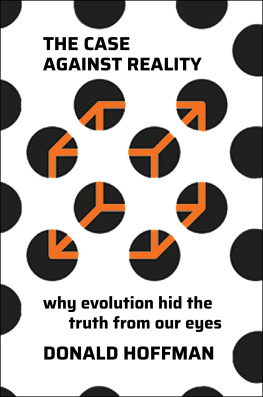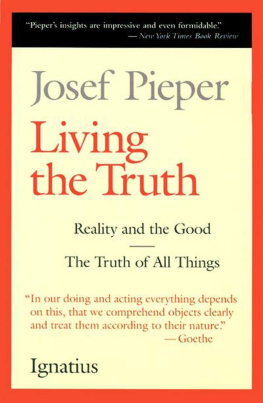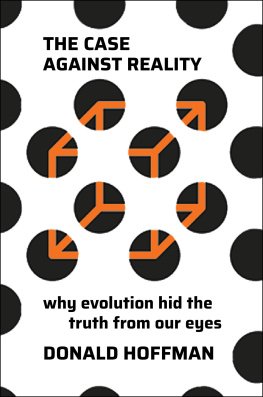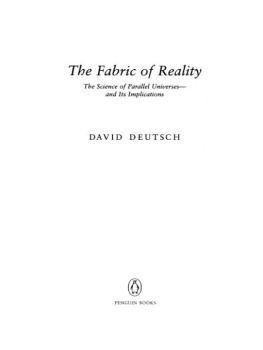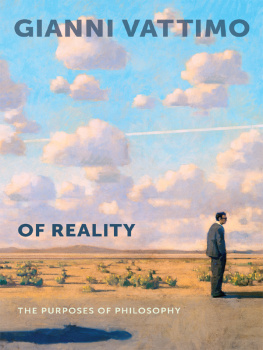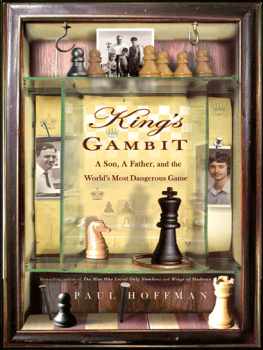Contents
Guide

The Case
Against
Reality
Why Evolution Hid
the Truth from Our Eyes
DONALD
HOFFMAN

To Joaquin, Noemi, and Cayetano,
I offer the red pill.
I think that tastes, odors, colors, and so on...
reside in consciousness. Hence if the living
creature were removed, all these qualities
would be wiped away and annihilated.
GALILEO GALILEI
CONTENTS
Y our eyes will save your life today. With their guidance, you will not tumble down stairs, leap before a speeding Maserati, grab the tail of a rattlesnake, or munch on a moldy apple.
Why are our eyes, and all of our senses, reliable guides? Most of us have a hunch: they tell us the truth. The real world, we assume, consists of cars and stairs and other objects in space and time. They exist even if no living creature observes them. Our senses are simply a window on this objective reality. Our senses do not, we assume, show us the whole truth of objective reality. Some objects are too small or too far away. On rare occasions our senses are even wrongartists, psychologists, cinematographers, and others can cook up illusions that fool them. But normally our senses report the truths we need to navigate safely through life.
Why do our senses exist to reveal the truth? Again, we have a hunch: evolution. Those of our ancestors who saw reality more accurately had an advantage over those who saw it less accurately, especially in critical activities such as feeding, fighting, fleeing, and mating. As a result, they were more likely to pass on their genes, which coded for more accurate perceptions. We are the offspring of those who, in each generation, saw objective reality more accurately. Therefore, we can be confident that we see it accurately. Our hunch, in short, is that truer perceptions are fitter perceptions. Evolution weeds out untrue perceptions. That is why our perceptions are windows on objective reality.
These hunches are wrong. On the contrary, our perceptions of snakes and apples, and even of space and time, do not reveal objective reality. The problem is not that our perceptions are wrong about this or that detail. Its that the very language of objects in space and time is simply the wrong language to describe objective reality. This is not a hunch. It is a theorem of evolution by natural selection that wallops our hunches.
The idea that our perceptions mislead us about objective reality, in whole or in part, has a long history. Democritus, around 400 BCE, famously claimed that our perceptions of hot, cold, sweet, bitter, and color are conventions, not reality. Philosophers ever since have debated the relation between perception and reality. The theory of evolution injects new rigor into this debate.
How can our senses be usefulhow can they keep us aliveif they dont tell us the truth about objective reality? A metaphor can help our intuitions. Suppose youre writing an email, and the icon for its file is blue, rectangular, and in the center of your desktop. Does this mean that the file itself is blue, rectangular, and in the center of your computer? Of course not. The color of the icon is not the color of the file. Files have no color. The shape and position of the icon are not the true shape and position of the file. In fact, the language of shape, position, and color cannot describe computer files.
The purpose of a desktop interface is not to show you the truth of the computerwhere truth, in this metaphor, refers to circuits, voltages, and layers of software. Rather, the purpose of an interface is to hide the truth and to show simple graphics that help you perform useful tasks such as crafting emails and editing photos. If you had to toggle voltages to craft an email, your friends would never hear from you.
That is what evolution has done. It has endowed us with senses that hide the truth and display the simple icons we need to survive long enough to raise offspring. Space, as you perceive it when you look around, is just your desktopa 3D desktop. Apples, snakes, and other physical objects are simply icons in your 3D desktop. These icons are useful, in part, because they hide the complex truth about objective reality. Your senses have evolved to give you what you need. You may want truth, but you dont need truth. Perceiving truth would drive our species extinct. You need simple icons that show you how to act to stay alive. Perception is not a window on objective reality. It is an interface that hides objective reality behind a veil of helpful icons.
But, you ask, if that speeding Maserati is just an icon of your interface, why dont you leap in front of it? After you die, then well have proof that a car is not just an icon. Its real and it really can kill.
I wouldnt leap in front of a speeding car for the same reason I wouldnt carelessly drag my blue icon to the trashcan. Not because I take the icon literallythe file is not blue. But I do take it seriously: if I drag the icon to the trashcan, I could lose my work.
And that is the point. Evolution has shaped our senses to keep us alive. We have to take them seriously: if you see a speeding Maserati, dont leap in front of it; if you see a moldy apple, dont eat it. But it is a mistake of logic to assume that if we must take our senses seriously then we are requiredor even entitledto take them literally.
I take my perceptions seriously, but not literally. This book is about why you should do the same, and why that matters.
I explain why evolution hid objective reality and endowed us instead with an interface of objects in space and time. Together, we will explore how this counterintuitive idea dovetails with discoveries in physics that are equally counterintuitive. And we will examine how our interface works and how we manipulate it with makeup, marketing, and design.
In chapter one, we confront the greatest unsolved mystery in science: your experience of the taste of dark chocolate, the smell of crushed garlic, the blare of a trumpet, the sensual feel of plush velvet, the sight of a red apple. Neuroscientists have found many correlations between such conscious experiences and brain activity. They have discovered that our consciousness can be split in half with a scalpel, and the two halves can have different personalities, with different likes, dislikes, and religious beliefs: one-half can be an atheist while the other believes in God. But despite all this data, we still have no plausible story about how brain activity might generate a conscious experience. This stunning failure suggests that we have made a false assumption. Hunting for a culprit led me to look more closely at how our senses are shaped by natural selection.
A clear example of this shaping is our sense of beauty. We explore, in chapter two, beauty and attraction through the lens of evolution. When you glance at another person, you immediatelyand unconsciouslypick up dozens of sensory clues, and run them through a sophisticated algorithm, forged by evolution, that decides one thing: reproductive potentialthe likelihood that this person could successfully raise offspring. Your algorithm, in a fraction of a second, summarizes its complex analysis with a simple feelingranging from hot to not. Through the course of the chapter, we examine specific clues of beauty in the human eye. Men are attracted to women with larger eyes that have larger irises, larger pupils, slightly bluish scleras (the whites of the eyes), and distinctive limbal ringsthe dark border between the iris and the sclera. What women want is more complex, and its a fascinating story that we will examine more closely. As we survey our sense of beauty, we absorb key concepts of evolution, learn useful tricks to spiff up portraits, and explore the logic of natural selectionincluding the logic that tempts us to deceive others by spiffing up.

